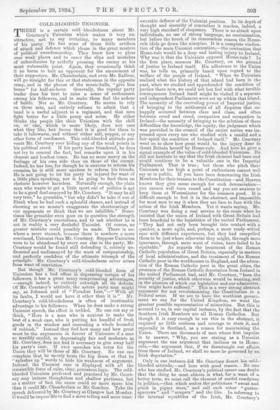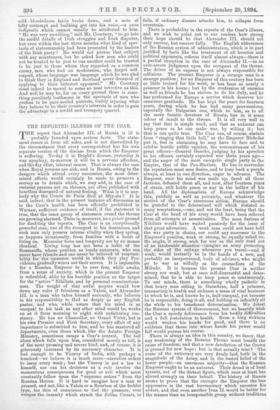COLD-BLOODED UNIONISM.
THERE is a certain cold -bloodedness about Mr. Courtney's Unionism which makes it very un- attractive, not to say irritating, to many members of his party. He has none of those little artifices of attack and defence which please in the great masters of political swordsmanship. They know how to gloss over weak places and to cover the slips and mistakes of subordinates by artfully pressing the enemy at his most vulnerable point. Again, they occasionally think it no harm to bait an opponent for the amusement of their supporters. Mr. Chamberlain, and even Mr. Balfour, will go straight for this or that statesman in the opposite camp, and in the phrase of the music-halls, "give him beans" for half-an-hour. Generally, the regular party leader does his best to raise a sense of enthusiasm among his followers, and to make them feel the ardour of battle. Not so Mr. Courtney. He scorns to rely on these arts, and entirely refuses to admit that a band is a useful adjunct to a regiment, and that men fight better for a little pomp and noise. He either thinks the people like their Unionism with the chill on, or else, which is more likely, does not care what they like, but know that it is good for them to take it lukewarm, and without either salt, pepper, or any other form of condiment. This cold-blooded attitude pre- vents Mr. Courtney ever hiding any of the weak points in his political creed. If his party have blundered, he does not try to conceal the fact, but remarks upon it in his clearest and loudest tones. He has no more mercy on the feelings of his own side than on those of the enemy. Indeed, he has less, for though he is anxious to reform his enemies, he is still more anxious to reform his friends. He is not going to let his party be injured for want of a little plain speaking, nor is he going to feed them on rhetoric however harmless. Naturally enough, the plain man who wants to get a little sport out of politics is apt to be a good deal annoyed by Mr. Courtney. "It may be all very true," he grumbles, "but why didn't he take it out of Blank when he had such a splendid chance, and instead of showing us we mustn't exaggerate the shortcomings of our opponents or think that we are infallible." Some- times the grumbler even goes on to question the strength of Mr. Courtney's convictions, and to ask whether he is not in reality a very doubtful Unionist. Of course, no greater mistake could possibly be made. There is no- where a more staunch, because there is nowhere a more convinced, Unionist than Mr. Courtney. Suppose Unionism were to be abandoned by every one else in the party, Mr. Courtney would be found still defending it, entirely un- daunted and undismayed by the want of companionship, and perfectly confident of the ultimate triumph of the principle. Mr. Courtney's cold-bloodedness never arises from want of conviction.
But though Mr. Courtney's cold-blooded form of Unionism has a bad effect in depressing certain of his followers, it has a great many compensating advantages, —enough indeed, to entirely outweigh all its defects. Of Mr. Courtney's attitude, the astute party man might say, as Johnson said of "Paradise Lost," —" With all its faults, I would not have it other than it is." Mr. Courtney's cold-bloodedness is often of inestimable advantage to his followers. When he does make a strong Unionist speech, the effect is trebled. No one can say or think, "Here is a man who is anxious to make the best of a weak case, who is putting his handful of fresh goods in the window and concealing a whole houseful of rubbish." Instead they feel how many and how great must be the arguments in favour of Unionism if a man so terribly candid, so depressingly fair and moderate as Mr. Courtney, does not find it necessary to give away half his party's case. If ever speeches win votes for the Union they will be those of Mr. Courtney. No one can complain that he merely beats the big drum or that he "splashes up" words to hide his weakness of argument. Instead, the Unionist case is displayed with all the irresistible force of calm, clear, persistent logic. The cold- blooded Unionism professed and practised by Mr. Court- ney may irritate thoughtless and shallow partisans, but as a matter of fact the cause could no more spare him than it could Mr. Chamberlain or Mr. Goschen. Take the speech delivered by Mr. Courtney at Glasgow last Monday. It would be impossible to find a more telling and more unan- swerable defence of the Unionist position. In its depth of thought and sincerity of conviction it reaches, indeed, very high standard of eloquence. There is no attack upon individuals, no use of strong language, no recrimination, but before the brush of its remorseless reason the Home- rule idols go down like ninepins. It is a complete vindica- tion of the main Unionist contention,—the contention that Home-rule would be a deep and lasting injury to Ireland. Why was it that the Unionists opposed Home-rule In the first place, answers Mr. Courtney, on the ground of justice to Ireland itself. His adherence to the Union was, he tells us, primarily based upon regard to the welfare of the people of Ireland. " When we Unionists realised what the history of that island had been in the past, when we studied and apprehended the condition of parties there now, we could not but feel with what terrible consequences Ireland itself might be visited if a separate and independent Parliament were set up within that island. The necessity of the overruling power of Imperial justice, of bringing to the settlement of all disputes that un- happily occurred. between class and class, and often between creed and creed, occupation and occupation in Ireland—the necessity of bringing to the solution of these difficulties the knowledge, the equity, the judgment which was provided in the council of the entire nation was im- pressed upon every one who studied with a candid and a fair spirit the condition of Ireland itself." Mr. Courtney went on to show how great would be the injury done to Great Britain herself by Home-rule. And here he gave a signal example of the value of cold-blooded Unionism. He did not hesitate to say that the Irish element had been and would continue to be a valuable one in the Imperial Parliament. That is true ; but those who pitch their Unionism at too high a point of enthusiasm cannot well say so in public. If you have been denouncing the Irish Members for their treason to the Constitution—and Heaven knows they give cause enough for such denunciation— you cannot well turn round and say you are anxious to keep them at Westminster for the common good. It is difficult enough to feel it in the abstract, and impossible for most men to say it when they are face to face with the action of the Irish Members. Yet it wants saying. Mr. Courtney was doing a real service to the cause when he insisted that the union of Ireland with Great Britain had been beneficial to the legislation of the united Parliament. "They had not only been brought into contact With a quicker, a more agile, and, perhaps, a more ready-witted race with different experiences, but they had compelled them to be just where otherwise they might, through mere ignorance, through mere want of vision have failed to be equitable." As regards the treatment of the Roman Catholic population of Great Britain, especially in matters of local administration, and the treatment of the Roman Catholic poor in the workhouses in England, and the educa- tion of the Roman Catholic poor in the great cities, the presence of the Roman Catholic deputation from Ireland in the united Parliament had, said Mr. Courtney, "been the security of justice, which otherwise would be wanting, and in the absence of which our legislation and our administra- tion might have suffered." This is a very strong abstract argument for not revolutionising the Constitution in a Federal sense. If we are to have the worthiest govern- merit we can for the United ICingdom, we want the greatest possible representation of minorities. But this is secured to us in one capital instance, by the fact that the Southern Irish Members are all Roman Catholics. But though it is easy enough to see this in the abstract, it required no little coolness and. courage to state it, and especially in Scotland, as a reason for maintaining the Union. There are thousands of men whose first impulse is to answer, "Why, you are stating as a Unionist argument the one argument that inclines us to Home- rule,—the argument that, if we disentangle our affairs from those of Ireland, we shall no more be governed by an Irish deputation."
Only in one instance did Mr. Courtney desert his cold- blooded attitude,—and. here with good reason. No one who has studied Mr. Courtney's political career can doubt that the thing he most abhors is what, for a want of a better term, we must call the element of sordid rowdyism in politics,—that which makes the politicians "sweat and pinch in pigmy wars," and call each other " gutter- sparrows " and soupers " and the like. In referring to the internal squabbles of the Irish, Mr. Courtney's cold - bloodedness fairly broke down, and a note of lofty contempt and loathing got into his voice,—a nova indignatio which cannot usually be attributed to him. "He was very unwilling," said Mr. Courtney, "to go into the sordid details of Irish struggles and Irish disputes, but even within the last three months what kind of spec- tacle of statesmanship had been presented by the leaders of the Irish party ? He would not pursue that subject with any minuteness, but he asked how men who could not be trusted to be just to one another could be trusted fo be just to those whom they regarded as a common enemy, men who had no moderation, who forgot self- respect, whose language was language which he was glad to think they in England and Scotland never dreamed of applying to their bitterest opponent." Mr. Courtney must indeed be moved to come so near invective as this. And well he may be, for on every ground there is some- thing peculiarly loathsome in the spectacle of men who profess to be pure-souled patriots, visibly injuring what they believe to be their country's interests in order to gain the advantage in a sordid and trumpery quarrel.







































 Previous page
Previous page